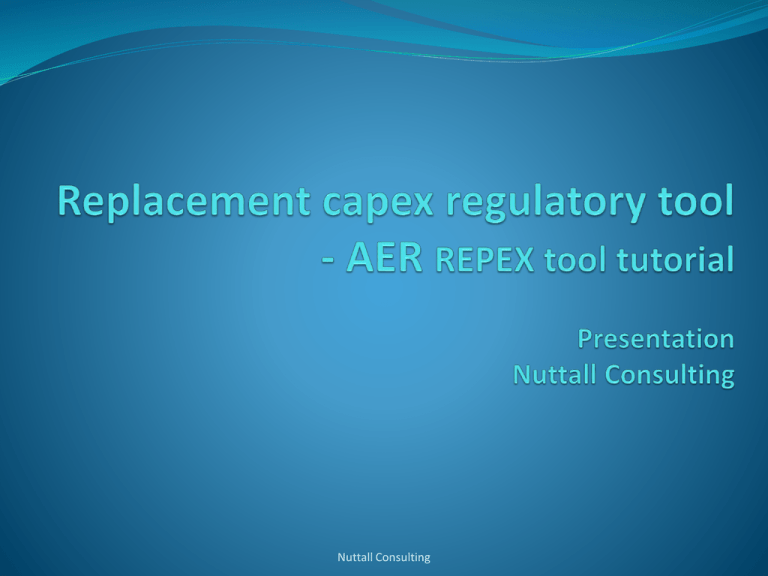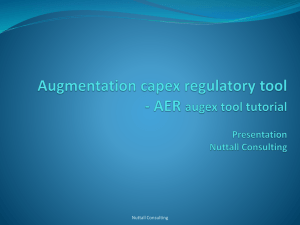asset category
advertisement

Nuttall Consulting Purpose overview of the form and use of the AER’s repex tool Not Detailed reference material on the underlying spreadsheets Defence of the tool’s regulatory role and suitability Nuttall Consulting Summary Background Repex model data requirements Overview of workbook – repex modelling tool Overview of replacement algorithm Discussion of issues raised Nuttall Consulting Nuttall Consulting Background – capex category Network capex driver Demand driven Non-demand driven Asset activity Replacement of assets with increased capacity (higher service level) Development of new network Replacement of assets with modern equivalent (similar service level) Installation of new assets Non-demand-driven replacement of an asset with its modern-equivalent, where the timing of the need can be directly or implicitly linked to the age of the asset Nuttall Consulting Background - key aims Regulatory tool NOT planning/management tool Should account for main driver at aggregate level but not concerned with excessive detail Allow intra- and inter-company comparisons Targeting of matters for detailed review Development of benchmarks Nuttall Consulting Form of model Similar, in principle, to tools used by other regulators and NSPs Ofgem in the UK ESV, OTTER, ESCOSA – the “PB model” Numerous NEM DNSPs – the “PB model” and internal Inputs Outputs • asset state • asset ages and quantities • planning parameters • asset lives and replacement cost • forecast replacement volumes • forecast replacement capex • forecast average ages Nuttall Consulting Form of model Tool is spreadsheet based - uses VBA functions Does not rely upon proprietary – or “black box” – algorithms Uses standard probability theory – covered in numerous text books and papers Relatively simple to independently verify Nuttall Consulting Role – past application of tool Repex tool assessment 1 - Base-case 2 - Calibration 3- Comparison • Prepare individual DNSP models based upon DNSP data • Derive planning parameters from actual historical information of DNSP • Prepare individual DNSP calibration models • Derive benchmarks parameters based upon set of DNSPs’ calibrated planning parameters • Prepare individual DNSP benchmark models inform other elements of the review for example, targeting matters for more detailed review, set expenditure allowance Nuttall Consulting Nuttall Consulting Format of network model Physical representation of network – volumes of assets Multiple asset categories used to improve accuracy allows for differences between networks reduce impact of aggregation For example, for poles we may have separate categories Different voltage levels carried by poles Different pole construction materials Different locations. Historically 30 – 100 separate asset categories defined Nuttall Consulting Data – asset grouping Each asset category must be assigned to an asset group allows aggregation for analysis and reporting AER previously defined 13 asset groups for distribution Poles Distribution transformers Zone other Pole top structures Distribution switchgear SCADA and protection Conductors Distribution other Other Underground cables Zone transformers Services Zone switchgear Nuttall Consulting Data – asset category data For each asset category 1. Asset group ID 2. Asset replacement unit cost (mean unit cost) 3. Asset replacement life parameters Mean life b) Standard deviation (assumes a normal distribution) a) 4. Replacement method 5. Age profile – array of the volume of assets at ages (0 to 90 years old) Nuttall Consulting Supporting data Previous RINs have included information requests to support DNSP data and aid in the AER’s analysis For each asset category defined by the DNSP descriptions of the asset category historical asset replacement levels and expenditure explanations of the DNSP’s determination of asset life parameters, including appropriate distributions explanations of the DNSP’s determination of the unit costs, including variability and relationship to historical costs Nuttall Consulting Nuttall Consulting workbook structure Input sheets Model initialisation data sheet – “Tables” Asset category data input sheet – “Asset data” Output sheets Asset category summary sheet – “Age profile summary” Replacement forecast sheet – “RRR hist-forc” Chart sheets Age profile – “age profile” Replacement forecast – “Forecast Ch1” and “Forecast Ch2” Internal calculation sheets Nuttall Consulting Overview of demo model Nuttall Consulting See handbook for more detailed reference material Nuttall Consulting Nuttall Consulting Forecasting algorithm To account for variations in lives, a probabilistic asset replacement life is used Planning parameters asset life replacement unit cost (probability distribution) Asset state volume of assets survived to age - a Probabilistic model Volume replaced Nuttall Consulting X Capex probabilistic algorithm Use survivor / hazard curve principles to predict replacement quantities in a forecast year Given the unconditional probability distribution for the replacement life of the asset existing volume of assets at a certain age – i.e. the volume of assets that have survived to that age The unconditional probability distribution is then transformed into a conditional distribution appropriate for the assets, given they have survived to that age The condition probability distribution is then used to determine the proportion of these asset replaced in future years Nuttall Consulting VBA function Array function =repcalc(age profile, method, life, SD, years, recursive, initial year) Inputs Age profile – array of age profile (replacement cost by installation date) Method – replacement method Life – mean replacement life SD – standard deviation of life Years – number of years for forecast Recursive – if TRUE, allow replaced assets to be replaced Initial year - if TRUE, 1st year of forecast is year after last year of age profile Outputs Array of forecast replacement expenditure by year Array of forecast average age by year Nuttall Consulting VBA function – worked example Pre-function calculations – to form age profile for VBA function Asset data sheet Use input volume age profile Multiply by replacement cost to form replacement cost age profile Age profile (Inst) sheet Transformer to replacement cost age profile by installation date Now assume an asset category defined in the model We are using the probabilistic replacement approach, where Mean replacement life = 50 years SD of replacement life = 10 years Replacement cost = $1,000 per unit replaced And we have array replacement cost age profile by installation date 1st year of forecast is 2014 Nuttall Consulting VBA function – worked example VBA function steps through each element of the age profile to prepare a forecast for assets installed at that date That is, assets that have survived to current date For example, assume we still have 100 assets that were installed in 1960 That is, 100 asset that have survived to be 53 year old Or a replacement value of $100,000 that has survived to be 53 year old Nuttall Consulting Probability distributions unconditional replacements value replaced ($k) 12.0 replaced, given survived to 53 10.0 8.0 6.0 4.0 2.0 0.0 20 30 40 50 60 70 age Proportion replaced in year, y, given the assets have survived to be 53 = 𝑢𝑛𝑐𝑜𝑛𝑑𝑖𝑡𝑖𝑜𝑛𝑎𝑙 𝑝𝑟𝑜𝑏𝑎𝑏𝑖𝑙𝑖𝑡𝑦 𝑓𝑜𝑟 𝑟𝑒𝑝𝑙𝑎𝑐𝑖𝑛𝑔 𝑎𝑡 𝑎𝑔𝑒 53 + 𝑦 𝑢𝑛𝑐𝑜𝑛𝑑𝑖𝑡𝑖𝑜𝑛𝑎𝑙 𝑝𝑟𝑜𝑏𝑎𝑏𝑖𝑙𝑖𝑡𝑦 𝑟𝑒𝑝𝑙𝑎𝑐𝑒𝑚𝑒𝑛𝑡𝑠 𝑤ℎ𝑒𝑛 𝑜𝑙𝑑𝑒𝑟 𝑡ℎ𝑎𝑛 53 Nuttall Consulting 80 Aggregating replaced, given survived to 53 value replaced ($k) 12.0 10.0 8.0 6.0 4.0 2.0 0.0 1 2 3 4 5 6 7 8 9 10 11 12 13 14 15 16 17 18 19 20 forecast year Forecast is summation of this calculation for each element of the age profile Algorithm also tracks and outputs the average age of the forecast age profile Nuttall Consulting Nuttall Consulting Common issues raised age is not a proxy for condition/risks as assumed by the model model does not allow for different operating environments use of “normal” probability distribution rather than “Weilbull” use of square root of mean as the standard deviation “inferred historical lives” often above “industry benchmark” lives use of “estimated” volumes and costs for inferring historical lives “goodness of fit” and “fit for purpose” of model forecasts Nuttall Consulting Nuttall Consulting









